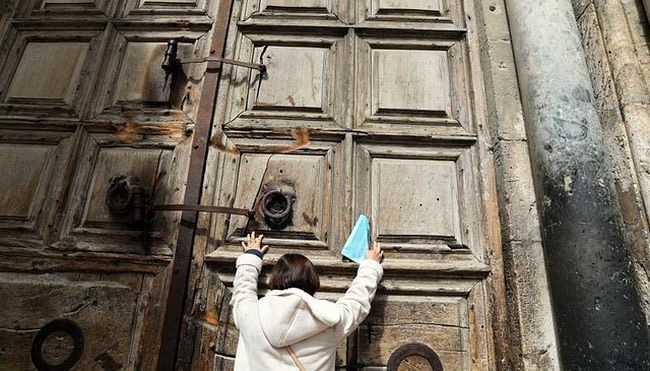Holy Sepulchre reopens after three-day closure
 The Church of the Holy Sepulchre, the holiest site in all of Christendom, reopened early this morning following a three-day closure in protest of the municipality’s plan to begin collecting back-taxes on Church-owned properties. The issue has been resolved, at least for now, after Prime Minister Benjamin Netanyahu stepped in to halt the measures that had angered the Orthodox Church and the various Christian confessions represented in the Holy Land, reports The Jerusalem Post.
The Church of the Holy Sepulchre, the holiest site in all of Christendom, reopened early this morning following a three-day closure in protest of the municipality’s plan to begin collecting back-taxes on Church-owned properties. The issue has been resolved, at least for now, after Prime Minister Benjamin Netanyahu stepped in to halt the measures that had angered the Orthodox Church and the various Christian confessions represented in the Holy Land, reports The Jerusalem Post.
A statement released yesterday reads:
We, the heads of Churches in charge of the Holy Sepulcher and the Status Quo governing the various Christian Holy Sites in Jerusalem - the Greek Orthodox Patriarchate, the Custody of the Holy Land and the Armenian Patriarchate - give thanks to God for the statement released earlier today by Prime Minister Netanyahu and offer our gratitude to all those who have worked tirelessly to uphold the Christian presence in Jerusalem and to defend the Status Quo.
…
Following these recent developments we hereby announce that the Church of the Holy Sepulcher, that is the site of the crucifixion of Our Lord and also of His Resurrection, will be reopened to the pilgrims tomorrow, February 28th, 2018 at 4.00 AM.
The church was officially closed on Sunday at 12:30 PM, with His Beatitude Patriarch Theophilos III of Jerusalem reading out a statement on behalf of the Orthodox Church and the Armenian and Catholic confessions that share use of the Church of the Holy Sepulchre. As the Church complex includes the sites of Golgotha where Christ was crucified and His holy tomb where He rose from the dead on Pascha Sunday, various Christian confessions desire to worship there.
The decision to close the church was in response to the “scandalous collection notices and orders of seizure of Church assets, properties and bank accounts for alleged debts of punitive municipal taxes,” which violate the long-standing status quo which guarantees “the rights and privileges of the Churches.” However, Jerusalem Mayor Nir Barkat responded that the churches of Jerusalem owe more than $180 million, and “We will no longer demand the residents of Jerusalem to bear this burden and subsidize this huge debt.”
The keepers of the holy site decided to reopen it to pilgrims after the Prime Minister’s intervention led to Jerusalem authorities expressing their readiness to begin negotiations on the settlement of the dispute with the with the suspension of the tax collection. Netanyahu was moved to get involved after it became clear that the church closure stood to cause Israel serious diplomatic damage, with both Jordan and the Palestinians claiming the situation was an indication that Israel was “threatening the presence of Christians in the Holy Land.”
Netanyahu and Jerusalem Mayor Nir Barkat agreed to establish a team to work on finding a solution to the issues involved. In addition to the tax plans, the churches were also protesting a bill that would authorize authorities to expropriate land sold by churches, with compensation going to the investors who had purchased the properties. Lawmakers say the legislation was designed to protect Jerusalem citizens who owned homes on previously-Church-owned property, but which had been sold out, leaving the future of the homes uncertain.
Tax collection efforts and the legislation on the sale of church properties have been suspended in the meantime.
In announcing the arrangement, the Netanyahu’s office issued a statement: “Israel is proud to be the only country in the Middle East where Christians and believers of all faiths have full freedom of religion and worship. Israel is home to a flourishing Christian community and welcomes its Christian friends from all over the world.” Jerusalem municipal authorities also welcomed the chance to resolve the issue, while emphasizing that it is “determined to resolve past debts and future tax payments, according to the law, for the sake of the residents of Jerusalem.”
Source: Orthochristian.com






